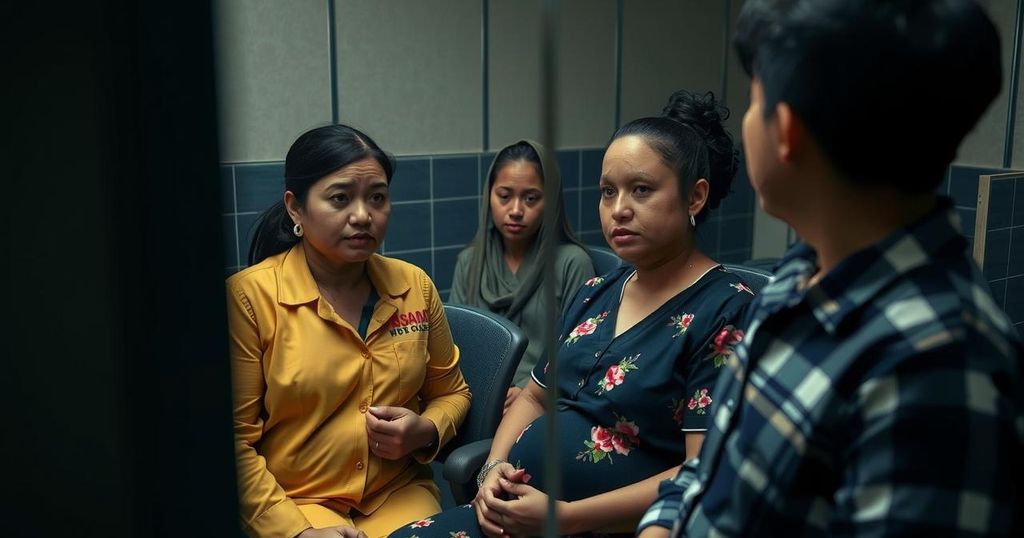Politics
AFP, ASIA, BUN ENG, CAMBODIA, CHINA, CHO, CHOU BUN ENG, DEPORTATION, DRUG TRAFFICKING, HUMAN TRAFFICKING, KANDAL, KANDAL PROVINCIAL COURT, LAW ENFORCEMENT, MEXICO, NICHOLAS FELIX TY, NORTH AMERICA, PHILIPPINES, PHILIPPINES DEPARTMENT OF JUSTICE, PHNOM PENH, REPATRIATION, THAILAND
Nia Simpson
Thirteen Filipino Surrogates Convicted of Human Trafficking in Cambodia
Thirteen Filipino women have been convicted of human trafficking in Cambodia for intended surrogacy, receiving sentences of four years in prison, with two years suspended. The case highlights the continued prevalence of illegal surrogacy amid existing bans, and raises questions regarding the treatment of the women involved, who claim to be victims of trafficking.
A Cambodian court has convicted thirteen Filipino women of human trafficking related to surrogacy, sentencing them to four years in prison, with two years suspended. The Kandal Provincial Court indicated they possessed substantial evidence of the women’s intent to sell the babies for money, qualifying their actions as human trafficking. The women will not serve jail time until they give birth, and the court did not clarify the fate of the infants upon birth. While commercial surrogacy is illegal in Cambodia, the practice prevails despite prohibitions. Furthermore, it is atypical for surrogates to be transported from their home countries for childbearing purposes, as seen in this case. Police apprehended the women during a raid on a villa near Phnom Penh on September 23. Nicholas Felix Ty, a Philippine Department of Justice undersecretary, asserted that the women are victims of human trafficking, a sentiment that was dismissed by Cambodian Interior Minister Chou Bun Eng, who held the women accountable for their actions. Four Vietnamese women and seven other Filipino women were also detained but subsequently deported due to not being pregnant. Additionally, a Cambodian accomplice received a two-month jail term for providing meals to the surrogates. The surrogacy market flourishes in developing nations due to significantly lower costs, drawing international couples willing to pay substantial sums for such arrangements. Since the Cambodian government banned commercial surrogacy after its rise post-2016, the industry has maintained its existence. Past incidents, such as the 2017 conviction of an Australian nurse running a surrogacy clinic and the release conditions placed upon 32 surrogates in 2018, illustrate the ongoing complexities surrounding this issue.
The topic of human trafficking and surrogacy remains contentious, particularly in regions where surrogacy laws are ambiguous or poorly enforced. Cambodia experienced a surge in its commercial surrogacy industry following the 2016 ban in Thailand, making it an attractive destination for international couples. Despite legal prohibitions, agencies continue offering surrogacy services, leading to ongoing ethical and legal challenges. The situation is further complicated when individuals who appear to be facilitators of surrogacy may also be victims of trafficking, highlighting the nuanced dynamics of exploitation in such cases. The Cambodian legal system grappled with these challenges, as demonstrated in the recent case involving the conviction of thirteen Filipino women.
In summary, the conviction of thirteen Filipino women for human trafficking related to surrogacy in Cambodia underscores the complexities interwoven within this contentious issue. While surrogacy is illegal, the practice persists, drawing individuals into a web of exploitation and legal entanglement. This case not only highlights the necessity for clearer regulations surrounding surrogacy but also draws attention to the potential victimization of those involved. The ongoing evolution of surrogacy laws in Cambodia will require careful consideration by policymakers to ensure the protection of all parties involved in the process.
Original Source: www.bbc.com






Post Comment